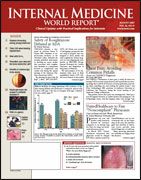Publication
Article
Internal Medicine World Report
Once-Yearly IV Bisphosphonate Builds Bone, Prevents Fractures
Author(s):
Efficacy Greater in Younger than Older Women
By Daniel M. Keller, PhD
MONTREAL, Canada—A once-yearly IV infusion of 5 mg of zoledronic acid (Zometa) can increase bone mineral density (BMD) and prevent fractures in osteoporotic postmenopausal women of all ages.
Ian Reid, MD
Jonathan Adachi, MD, professor of medicine at McMaster University in Hamilton, Ontario, reported at the annual meeting of the International Bone and Mineral Society the subgroup findings from the multinational Health Outcomes and Reduced Incidence with Zoledronic Acid Once Yearly Pivotal Fracture Trial (HORIZON-PFT).
In the main part of the HORIZON-PFT study (N Engl J Med. 2007;356: 1809-1822), which looked at the effect of zoledronic acid across age-groups and geographic regions, annual infusions were shown to be as effective in reducing bone turnover and increasing BMD as daily doses of oral bisphosphonates. Vertebral fractures were reduced by 70%, hip fractures by about 40%, and nonvertebral fractures by 25% over the course of 3 years.
A total of 7736 women (aged 65-89 years) were randomized equally to once-yearly infusions with zoledronic acid or to placebo and were followed for 3 years. They all received calcium (1000-1500 mg/d) and vitamin D (400-1200 IU/d) supplementation. Entry criteria were a femoral neck T-score of ?2.5 or less, with or without fracture, or ?1.5 or less, with 2 mild or 1 moderate vertebral fracture.
"Here we have a study that looked at those who were older than 75, and it still shows a robust treatment effect" of a 44% reduction in all clinical fractures, Dr Adachi said. And although zoledronic acid infusion significantly reduced the risk of vertebral, hip, and all clinical fractures for all age-groups (<70, 70-74, and ≥75 years), it appeared to be more effective in the younger women.
"As clinicians we can rest assured that our therapies are working not only in the younger individuals but in the older individuals who are probably at highest risk," Dr Adachi concluded.
Currently, IV zoledronic acid is indicated only for the treatment of multiple myeloma, metastatic bone lesions from solid tumors, and hypercalcemia of malignancy.
Dr Adachi emphasized that the doses used in HORIZON-PFT for osteoporosis were about one tenth of those used in cancer treatment on a yearly basis. "That's important, because of the concerns around osteonecrosis of the jaw" documented in cancer patients, Dr Adachi said. "In this trial, we saw one case of osteonecrosis of the jaw in the placebo group and one case in the active treatment group?.The risks of having a hip fracture and dying from that hip fracture are far greater than the risks of ever developing osteonecrosis of the jaw" in this patient population and at this dose, according to Dr Adachi. (See also IMWR, September 2006.)
He postulates that a once-yearly bisphosphonate infusion could be another treatment alternative and notes that many patients express a preference for annual dosing. It also can help patients who cannot take a bisphosphonate orally because of gastric reflux, malabsorption, or inflammatory bowel disease.
"In the best of circumstances with the oral bisphosphonates, only 40% of patients are on therapy after 1 year," Dr Adachi notes, implying problems with tolerability and/or compliance. IV dosing was generally safe and well tolerated in this study.
Coinvestigator Ian Reid, MD, president of the International Bone and Mineral Society, said that HORIZON-PFT was an important and unique trial in that it enrolled almost 8000 women from regions across the globe.
"Even when you break this down by age-groups or by different geographies?you get exactly the same answer," he said, "so there's a very consistent reduction in fracture risks, however you cut and dice the data," said Dr Reid.
The appeal of once-yearly dosing is patient convenience, which may help to increase adherence over a long period of time for this mainly asymptomatic disease, he said. In his own practice,
Dr Reid is using zoledronic acid off-label for "quite a number of patients" who are unable to tolerate oral bisphosphonates.





